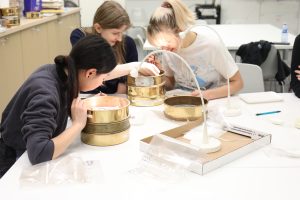UBC Anthropology has strong partnerships with the internationally-recognized Museum of Anthropology and the Laboratory of Archaeology.
Museum of Anthropology
Affiliated with UBC Anthropology, the Museum of Anthropology (MOA) is world-renowned for its collections, research, teaching, public programs, and community connections.
MOA is one of Canada’s largest teaching museums with cross-appointed faculty teaching courses in museum studies, museum education, and conservation as well as Indigenous and world art.
Laboratory of Archaeology
 The Laboratory of Archaeology (LOA) is committed to the scholarly study of the material evidence of past cultures. LOA recognizes the rights of Indigenous peoples and is committed to dealing sensitively and responsibly with Indigenous peoples on the care and disposition of these materials.
The Laboratory of Archaeology (LOA) is committed to the scholarly study of the material evidence of past cultures. LOA recognizes the rights of Indigenous peoples and is committed to dealing sensitively and responsibly with Indigenous peoples on the care and disposition of these materials.
For inquiries, please contact anth.archy@ubc.ca.
Since 1977, the Laboratory has occupied space in both the Anthropology & Sociology Building (ANSO) and the Museum of Anthropology (MOA). The ANSO building houses faculty offices and research areas, the GIS Lab and Geoarchaeology Lab.
Since 2010, the newly renovated LOA facilities, located in the Museum building, accommodate a state-of-the-art Collections Repository, the Borden Research Lab, the Lithic Analysis Lab, the Faunal/Botanical Lab (with research bays for faculty, graduate student, and visiting researcher projects), the Archaeochemistry Lab, the Ceramic Analysis lab, and the Scanning Electron Microscope Lab.
Our research facility also houses the Archaeology Archives and a “Transition Lab”– an area for processing artifacts, flotation, and receiving.
Ancient DNA and Proteins (ADαPT) Facility
The Ancient DNA and Proteins (ADαPT) Facility is part of the Laboratory of Archaeology at the Department of Anthropology. We have two lab locations: a dedicated biomolecular clean-lab in the Museum of Anthropology, and a ZooMS laboratory in the Anthropology-Sociology building. Our research projects involve the application of ancient genomics (ancient DNA), proteomics (ancient proteins) and ZooMS (Zooarchaeology by Mass Spectrometry) to study past human-environmental interactions, ancient diets and subsistence, and past marine ecosystems. We also specialize in species identification of archaeological faunal remains.
For inquiries, please contact Camilla Speller
LOA Open Lab Nights
 Open Lab Nights are a chance for students to get hands on experience in archaeology, and learn more about Musqueam culture and history.
Open Lab Nights are a chance for students to get hands on experience in archaeology, and learn more about Musqueam culture and history.